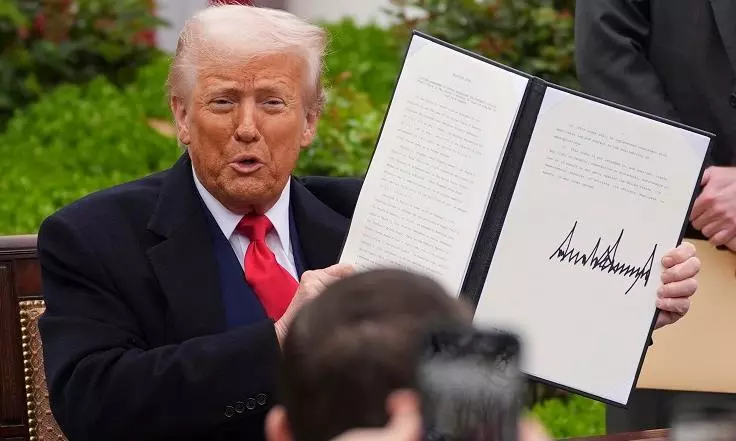
- Home
- India
- World
- Premium
- THE FEDERAL SPECIAL
- Analysis
- States
- Perspective
- Videos
- Sports
- Education
- Entertainment
- Elections
- Features
- Health
- Business
- Series
- In memoriam: Sheikh Mujibur Rahman
- Bishnoi's Men
- NEET TANGLE
- Economy Series
- Earth Day
- Kashmir’s Frozen Turbulence
- India@75
- The legend of Ramjanmabhoomi
- Liberalisation@30
- How to tame a dragon
- Celebrating biodiversity
- Farm Matters
- 50 days of solitude
- Bringing Migrants Home
- Budget 2020
- Jharkhand Votes
- The Federal Investigates
- The Federal Impact
- Vanishing Sand
- Gandhi @ 150
- Andhra Today
- Field report
- Operation Gulmarg
- Pandemic @1 Mn in India
- The Federal Year-End
- The Zero Year
- Science
- Brand studio
- Newsletter
- Elections 2024
- Events
- Home
- IndiaIndia
- World
- Analysis
- StatesStates
- PerspectivePerspective
- VideosVideos
- Sports
- Education
- Entertainment
- ElectionsElections
- Features
- Health
- BusinessBusiness
- Premium
- Loading...
Premium - Events

Trump has willy-nilly hacked US’s imperialist hydra-headed monster that for over a century has meddled in the internal affairs of every country in the world
Move over Lenin, Mao and Ho Chi Minh. Make way for Donald Trump. For, he is turning out to be the most effective anti-imperialist compared to the hallowed Communists of the past.
The world is agog with Trump’s imposition of reciprocal tax on every other country in the world, ostensibly to correct a historic wrong. Trump’s argument is that the world has taken the US for a ride, and it is time to halt it, to seek retribution, and correct the imbalance in tariffs between the US and all other nations.
Watch: As China replies to US with tariff hike, where does India stand in global trade war?
Drastic changes for MAGA goal
The maverick and unpredictable Trump sees himself as a “messiah” out to save the US and “make America great again”. Clearly, Trump is viewing trade as a businessman rather than a politician, or for that matter as US president.
Otherwise, which president in his right senses will dismantle, without provocation, a century of work by his predecessors to build the US into a mega superpower, defeat existential rivals like the erstwhile Soviet Union, and literally dictate even minute happenings anywhere in the world.
Trump, by a simple signature on paper, has managed to do what world leaders and nations opposed to the US have tried for decades to do but in vain.
Trump, by his contentious actions since he became president for the second time, has undercut the power of the US in no uncertain terms.
Were Trump’s predecessors myopic?
A set of simple questions will provide insightful answers to his shock-and-awe decisions. For example, why did past US administrations allow trade that prima facie favoured other countries from the point of view of tariffs? Were Trump’s predecessors so myopic and half-literate that they squandered US interests to keep others happy at their own expense? And, why did the US end up as the major donor for world organisations like the United Nations and USAID, among others?
Also read: Trump’s tariff tsunami threatens to drown Bangladesh garments industry
In the aftermath of the Second World War, the US poured millions of dollars into the reconstruction of its erstwhile enemies like Germany and Japan. Was it because its heart bled for the vanquished?
Dollar diplomacy
Obviously not. The US used “dollar diplomacy” to spread its influence and make itself indispensable to all these nations. The way to becoming a superpower was a carefully thought out plan and executed meticulously. None could stand in the way of the US juggernaut.
In return for monetary generosity, the beneficiary countries allowed the US to set up military bases, offer preferential trade and command enormous influence in their internal politics. And with it, US influence has grown exponentially, enabling it to become the superpower that it is.
According to various reports, in all, there are an estimated 750-900 US military bases of various sizes and potency around the world – made possible as a gesture of thanksgiving by the recipient countries. Of these, around 120 are in Japan, followed by Germany and South Korea. Europe, overall, has an extensive network of US military bases. These are estimates only, as the Pentagon does not release all information.
Also read: Trump and the reign of voodoo economics; India too on sticky wicket
Jekyll and Hyde foreign policy
The US, so far, followed a well-calibrated multi-pronged strategy, with the express intention of dominating the world since the end of the 19th century. It was as part of this that the US marketed itself as the world’s most democratic nation where individual freedoms were sacrosanct. This proved most effective, with hordes of the world’s best educated, most literate and accomplished individuals making a beeline to the US to savour the “milk and honey” of freedom and democracy. And much of what the US has achieved is due to this flood of migration.
The US followed a Jekyll and Hyde foreign policy. While internally, the US state promoted the image of a benevolent democracy – “the American Dream” – its external face was just the opposite.
No free lunches
Successive US administrations acted solely in terms of US interests, supporting dictatorships, engineering military coups, and faux revolutions. Its military spending is mind-boggling. According to available data, the US military budget is around $820 billion, larger than the next nine countries put together. Its display of military might, pragmatism, and ruthlessness in return for favours done (like beneficial tariffs) has managed to extract consent from the rest of the world to the point where subjugation to the might of Washington, DC is completely normalised.
Also read: Trump's Liberation Day mystery: Who actually devised tariff formula?
So, it was not a free lunch that Trump’s predecessors provided to the rest of the world. There were tight strings attached to every dollar that was given either as a gift, grant or aid to anyone. It may be hard to swallow this, but Trump and his supporters have either wilfully or by oversight missed this point. Or, the Republicans are going by the 180-page (as yet unreleased) guide that forms part of the larger Project 2025 strategy document.
Time for new alliances
By insisting on reciprocal tariffs and reducing multi-layered relationships to the most superficial buy-and-sell model, Trump has willy-nilly freed the rest of the world from its historical obligation to the mighty United States.
Nations in Europe, which had got used to the idea of US largesse, find themselves in the cold. The manner in which Trump has gone about striking a peace deal between Russia and Ukraine is the latest example of how impotent the once-powerful coloniser-nations like Germany, Britain and France look.
Watch: Is India immune to Trump's tariff tirade?
Others like Japan and South Korea, who had assumed the US would be a friend for eternity, are shaken to the core by Trump’s tariffs. Now, they have to fend for themselves.
What Trump’s actions will do, therefore, is create the ground for fresh alignments and equations in which the US will play little or no part. For example, the European nations are already thinking of working out increasing trade arrangements with China, India and within the continent itself. Big economies in Southeast Asia like Japan and South Korea, both close US allies, have held discussions with rival China on possible new trade deals.
End of US influence?
The US will gradually find itself marginalised and out of the various equations that new arrangements are emerging from nations “hurt” by the reciprocal tariff, among other things. Humanitarian organisations, for instance, are aghast at the decision to stop USAID (United States Agency for International Development) funding and the drying up of money for the world’s marginalised nations, including Sudan and sub-Saharan Africa, that are suffering due to internal conflicts and natural calamities.
Also read: India faces selective trade headwinds from US tariff impact, apparel sector most hit
According to one report, the list of cancelled USAID projects runs into 368 pages, no less. Projects ranging from $10 million to $800 million across the world have all been scrapped. Some 15,000 jobs have been lost in the US, and 65,000 people around the world were unemployed overnight due to the scrapped USAID projects. The list of people affected runs into thousands more.
Internal damage to US
Some of the humanitarian programmes will suffer in the short to medium term. But once the world recovers from the shock of Trump, other moderate to big powers like China have indicated they will step in and pitch funds in which the US, for the first time, will have little or no role to play. What this effectively means is in due course, US influence will whittle down for the first time in a long while.
Trump and his coterie calculate that their policies will work wonders for the US economy – provide jobs and improve the living standards, especially for the Republican vote bank. Even if it does to some extent, the overarching loss that the US will experience across other fronts is bound to negatively impact the country internally.
Also read: Why retaliatory tariffs on US do not make sense for India
Already, thousands of federal employees within the US have lost their jobs and find themselves in an unexpected limbo due to Elon Musk’s decision to cut down on staffing. Now, Trump’s reciprocal tariffs are expected to push up prices of goods in the US, and it is logical that this will be a double whammy for a population that is already reeling under fresh unemployment.
World will have much to thank for
In effect what Trump has done is to hack the US’s imperialist hydra-headed monster that for over a century has meddled in the internal affairs of every nook and corner of the world, triggering grief and sparking conflicts.
Also read: Why is Trump calling April 2 ‘Liberation Day’? What does he want that day?
If Trump’s policies continue, even after he finishes with his term, the world will have much to thank for as the US role will be significantly diluted. If there is a quick reversal by the next administration, the current interregnum will have provided invaluable lessons that the rest of the world can put to good use in the future, in a post-Trump world.


